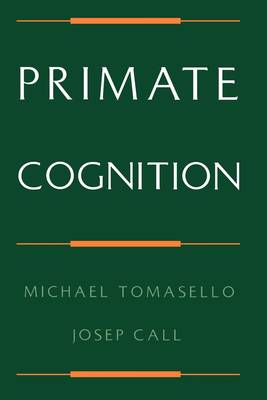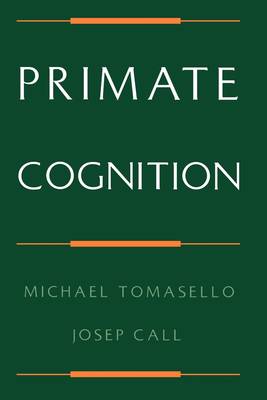
Bedankt voor het vertrouwen het afgelopen jaar! Om jou te bedanken bieden we GRATIS verzending (in België) aan op alles gedurende de hele maand januari.
- Afhalen na 1 uur in een winkel met voorraad
- In januari gratis thuislevering in België
- Ruim aanbod met 7 miljoen producten
Bedankt voor het vertrouwen het afgelopen jaar! Om jou te bedanken bieden we GRATIS verzending (in België) aan op alles gedurende de hele maand januari.
- Afhalen na 1 uur in een winkel met voorraad
- In januari gratis thuislevering in België
- Ruim aanbod met 7 miljoen producten
Zoeken
€ 164,95
+ 329 punten
Omschrijving
Soon after Charles Darwin formulated his theory of evolution, primate cognition became a major area of research. In this book, Michael Tomasello and Josep Call assess the current state of our knowledge about the cognitive skills of non-human primates. They integrate empirical findings on the topic from the beginning of the century to the present, placing this research in theoretical perspective. They begin with an examination of the way primates adapt to their physical world, mostly for the purpose of foraging. The second part of the book looks at primate social knowledge and focuses on the adaptations of primates to their social world for purposes of competition and cooperation. In the third section, the authors construct a general theory of primate cognition, distinguishing the cognition in primates from that of other mammals (human in particular). Their broad-ranging theory provides a guide for future research. Primate Cognition is an enlightening exploration of the cognitive capacities of our nearest primate relatives and a useful resource for a wide range of researchers and students in psychology, behavioral biology, primatology, and anthropology.
Specificaties
Betrokkenen
- Auteur(s):
- Uitgeverij:
Inhoud
- Aantal bladzijden:
- 528
- Taal:
- Engels
Eigenschappen
- Productcode (EAN):
- 9780195106244
- Verschijningsdatum:
- 18/09/1997
- Uitvoering:
- Paperback
- Formaat:
- Trade paperback (VS)
- Afmetingen:
- 155 mm x 235 mm
- Gewicht:
- 734 g

Alleen bij Standaard Boekhandel
+ 329 punten op je klantenkaart van Standaard Boekhandel
Beoordelingen
We publiceren alleen reviews die voldoen aan de voorwaarden voor reviews. Bekijk onze voorwaarden voor reviews.









